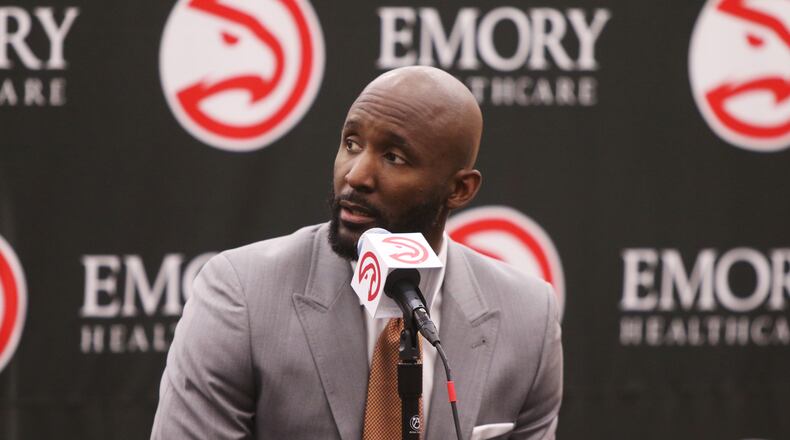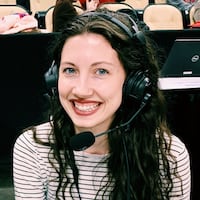Two days after the death of George Floyd in Minneapolis, Hawks coach Lloyd Pierce took to social media to express his emotion. He posted an up-close picture of himself to Instagram — but it wasn't just his own experience Pierce was describing.
“The post included me, but it wasn’t about me,” Pierce said. “It was about any person that’s black, any man that’s black.”
In a widely circulated video, Floyd, who was black, can be seen handcuffed and pinned to the ground as ex-Minneapolis police officer Derek Chauvin, who is white, presses his knee to Floyd's neck for nearly nine minutes as Floyd cries out that he can't breathe. Four Minneapolis police officers were fired Tuesday, and Chauvin was arrested Friday and charged with third-degree murder and manslaughter.
“There is an APPROPRIATE FEAR being a black man in America,” Pierce’s post read. “Feeling safe/protected is NOT an option for me. To think #JusticeforFloyd could easily be #JusticeforLloyd and it’s because we look alike (to those who discredit our existence). We are recycling hashtags and protests to no avail.”
Pierce, who volunteers with the Georgia Innocence Project and is passionate about using his platform to bring forth progress, took the picture up close for a reason.
“If I zoom out of that picture, you say ‘Oh, that’s coach Pierce,’ ” Pierce said. “When you zoom in, you have to think about it. And if you’re not even thinking about it, you just see a black man, then I’m in trouble. And at the end of the day, I may not be the Atlanta head coach down the line, or whenever that comes to an end, but I’ll always be a black man. So, I carry that all the time.”
In an internal memo sent out to all employees, signed by Pierce, owner Tony Ressler, CEO Steve Koonin, general manager Travis Schlenk and chief people, diversity and inclusion officer Camye Mackey, the Hawks condemned the “recent and recurring examples of weaponized racism, police brutality and race-based preferential treatment across the nation.”
Next Friday, the Hawks will host a company-wide workshop and conversation about race via Zoom, which will include a panel of Pierce, Koonin, Mackey, former Atlanta police chief George Turner who is the Hawks’ vice president of security, and others, with the hopes that other people, companies and organizations will follow suit. The conversation will be led by Al Vivian, who speaks about diversity and inclusion leadership and whose father, C.T. Vivian, was a close friend of Martin Luther King Jr. and a leader and organizer during the civil rights movement.
“We believe the path to real, lasting change begins with greater compassion for each other, understanding the experiences of what makes every one of us unique and educating each other on how our differences make us all valuable in today’s society,” the memo read. “That belief system alone is not enough though; it’s just the foundation. There must be action. ... We also want to give each of you a safe place to share with us and each other how you are feeling as several staff members have reached out to us or their team leaders about the despair they’re experiencing in light of the disturbing recent events.”
The Hawks had been discussing putting together some kind of conversation when a young woman who works in their ticket sales department, Shari-Zhane Harvin-Langley, emailed Koonin asking the Hawks to speak out against police brutality.
“Being a black woman in America, I am hurt and outraged by the murder of George Floyd by the four Minneapolis police officers,” part of her email read, per Koonin. “Police brutality toward black people in this country is a major issue. Many of our employees who are black share the same sentiments and fear of their own lives. ... Let’s be the first to make a stand and be the leaders of social justice.”
Harvin-Langley will have the chance to speak on the panel during the workshop, Koonin said.
“We’re in Atlanta,” Koonin said. “This is the cradle of the civil rights movement. And it’s important that our employees feel both connected and protected. We want them to understand that we want to create a better world and a better environment and a better city. That’s what our goals are. That’s what we’re trying to accomplish.”
It’s a conversation that has to happen, Pierce added.
“My voice as an African American voice, probably the biggest African American voice in our organization as a head coach, if I have the fear, who else has it?” Pierce said. “And there are a lot of people who have it, which we understand, so it has to happen. And it has to happen for a lot of reasons.”
It's particularly important to discuss these issues, Pierce said, when it comes to formulating a plan of action. Pierce pointed to his friend Killer Mike's comments at a press conference Friday, as protests morphed into violence and looting throughout the city: "If we lose Atlanta, what else we got? We lose an ability to plot, to plan, to strategize, to organize and to properly mobilize."
“What he said was powerful and very appropriate because it took into the context of, he’s angry, he’s upset, but his love and his pride for this city is still based on what this city represents,” Pierce said. “There’s so much context to what he said and how he said it. Now that we’ve showed our emotions, now what? We need to plan, we need to plot, we need to mobilize, we need to strategize. We need to do more than express anger and emotion. ... I’ve spoken to so many coaches throughout the NBA. I’ve spoken to everybody in the NBA that I can speak to, that I have access to. Because it’s about the plan, now. What can we do?”
The Hawks' memo mentions Floyd and Ahmaud Arbery, a 25-year-old black man from Brunswick who was fatally shot on Feb. 23, with Travis McMichael and his father Greg both later charged with felony murder and aggravated assault. William "Roddie" Bryan, who shot video capturing Arbery's death, was recently arrested and charged with felony murder and criminal attempt to commit false imprisonment, according to the Georgia Bureau of Investigation.
It lists Patricia Ripley, a woman facing first-degree murder charges after drowning her son (according to Miami-Dade police, Ripley had attempted to fake his abduction, claiming two black men ambushed her and took her phone and tablet and kidnapped her son, prompting an Amber Alert). It also mentions Breonna Taylor, a black woman who was fatally shot in her home by Louisville police officers while they were performing a narcotics search warrant, and Christian Cooper, a black man who was bird-watching in Central Park and asked Amy Cooper, who is a white woman, to put her dog on a leash, with Amy Cooper calling police and claiming "there's an African American man threatening my life."
For Pierce, the incident in Central Park was particularly scary. Amy Cooper has since lost her job at an investment firm.
“It’s just frustrating, because I can honestly say there’s a fear that I live with, and it’s an appropriate fear, because of what we’ve seen in Minnesota, Minneapolis, but that’s not the first time I’ve had this fear,” Pierce said. “The realest fear that I’ve had came Sunday night, and that fear was watching the lady in New York pull out her phone and, on camera, show us the power she felt she was capable of, and is, and the next day I wake up and I saw the results of her actions to another man.”
Having a conversation about that real fear and frustration is an important step that people need to take, Pierce said.
“I just feel there’s a lot of people that need to hear that black men, black people are living in fear,” Pierce said. “You may have seen the George Floyd incident, but have you heard your best friend or the dude you work with or the lady you work with speak about her fear every day, not just that day? Every day, because of this. ... For me, and what I’ve tried to express, this is where it’s important that I say something. It’s important that we all say something.
“And I’m trying to speak on behalf of a lot of people, a lot of black men, and I’m trying to speak to a lot of white men and a lot of white people, so that they hear me. Because what I’ve gotten when I’ve talked to people that aren’t of color, they express to me ‘I’m not a black man and I can’t pretend to know how you feel.’ And so it’s my job to express to them how I feel, so they can at least feel my pain, because they’re not going to feel what I feel, they’re not going to live in fear, they’re not going to be subject to the same deal, they’re not worried about their nephews and their sons and their cousins having to train themselves on how to deal with the police if they get pulled over. So I have to express that to them and every African American man needs to express that to every white person that they know, so that they understand better. But they’re not going to feel it, and I’m not here to blame a white person because he doesn’t feel what I feel, but I do want to explain it to him, so he has no excuse not to understand.”
>> COMPLETE COVERAGE: Atlanta protests
>> PHOTOS: Atlanta rally against police violence draws hundreds, turns violent
>> RELATED: Buckhead stores, restaurants clean up after a night of riots and looting
About the Author
Keep Reading
The Latest
Featured


